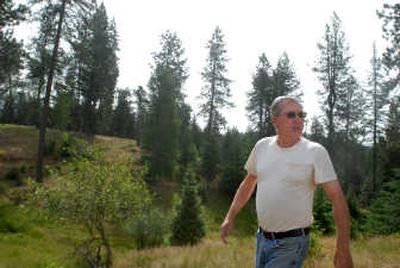Preserving peace of mind

HAUSER LAKE, Idaho – John Matheson can’t do much about stars being dimmed by the growing number of house lights.
Or the increasingly impatient drivers who flip off his tractor as he rumbles slowly down once-empty roads on the way to cut hay. Or the brook that’s been silted up with construction dust.
But Matheson can control his 155 acres of rolling forest and farmland. Not long ago, he and his wife, Nancy, decided it was time to protect the land forever from the same development pressure that’s been changing the landscape around Hauser Lake and the rest of the Inland Northwest.
“We hate what we see going on around us,” Matheson explained Friday as he walked to a hill overlooking his small home and the property, which was purchased by his grandfather nearly a century ago.
In early June, the Mathesons donated all development rights to their land to the Inland Northwest Land Trust, a nonprofit conservation organization based in Spokane that has helped protect 7,400 acres since 1991.
The land remains private property owned by the Mathesons, but no form of future development will be allowed. Matheson will grow hay on the land and selectively harvest timber, which he saws into lumber and firewood.
Interest in conservation easements has been rising thanks to temporary changes made last year in federal tax law, said Chris DeForest, executive director of the Inland Northwest Land Trust. The provision increases tax incentives for landowners to set up conservation easements.
“It’s bringing people who have been on the fence into the fold,” DeForest said. “It’s also gotten the attention of the money people: the accountants, the CPAs, financial planners.”
Congress is considering extending the change beyond its end-of-the-year expiration date, DeForest said.
By signing the conservation easement, the Mathesons effectively canceled their ability to sell off about 75 prime lots, most of which have a view of Hauser’s blue waters. The value of this donation will be established in coming weeks by an appraiser. Matheson will then be able to spread the value of the donation over the next 15 years of his income tax returns.
Given its hilly setting on the north side of Hauser Lake, the land could fetch a high price. But Matheson likes the land just as it is – he also thinks it’s important to save habitat for wildlife. Moose, deer and elk are often spotted in the bottomland around Hauser Creek, which flows through the property. In fall, black bears munch on apples in the Mathesons’ front yard.
“We’d like to live the rest of our lives knowing it’s not going to be developed,” said Matheson, who is retired after working 30 years at Kaiser Aluminum Corp. “The tax advantages are going to be nice, but we’d have done it without that.”